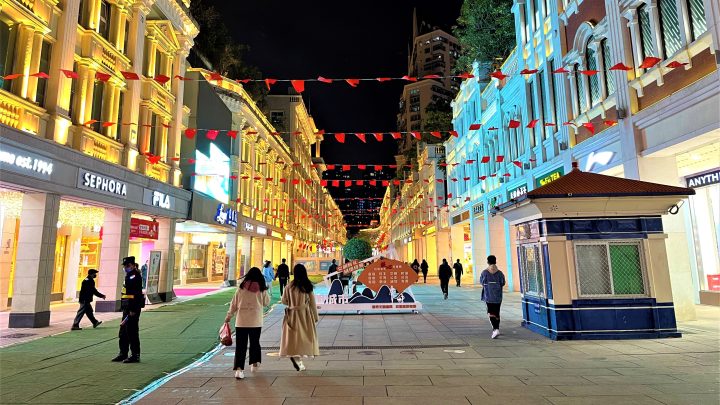
China ends zero-COVID, but are consumers ready to spend?
China ends zero-COVID, but are consumers ready to spend?

Movie theaters in China were frequently closed at short notice while the country’s zero-COVID policy was in force. The policy was introduced in January 2020 when the COVID-19 pandemic first began.
Moviegoers never really knew when cinemas would be open. That put off film lovers like Danny Xu in eastern Anhui province.
“Usually, I go to the movie theater twice a month, but during the pandemic, I’ve cut down to once a month,” he said.
The last movie he saw was “Avatar: the Way of Water.” It was the first Hollywood blockbuster approved by Chinese censors in a while and was simultaneously released on the same day as in the U.S.
But the film’s opening weekend starting on Dec. 16, 2022, took in 415 million yuan ($59.5 million), Chinese movie site Maoyan.com reported at the time, far less than the $100 million expected.
Consumption has slumped after nearly three years of China’s zero-COVID policy. Retail sales were down 5.9% in November. China is set to release its latest economic growth figures next Tuesday and it is not expected to show a huge rebound in consumption given that zero-COVID measures were mostly lifted only by mid-December.

Without pandemic restrictions, people were either recovering from COVID or feared getting sick if they went to crowded places like movie theaters.
“Avatar” fan Yuan Mengyi in Beijing said she intended to see the film but would only risk going when the theaters were less crowded.
Right now, she is in a buoyant mood.
“I think I might spend more in the year ahead because I want to travel now, perhaps to Hainan province,” Yuan said.
Without the restrictions, people can now splash out and move about more freely.
When I traveled with friends from Shanghai to the southern port city of Xiamen, Fujian province just after Christmas, everything went smoothly aside from our luggage taking a while to come out.
More airport staff were getting sick. Coughing and ambulance sirens became the soundtrack to our trip.
Despite media reports of overcrowded hospitals and crematoriums, China’s center for disease control and prevention has recorded only 45 people having died from COVID-19 between Nov. 19, 2022, and Jan. 8, 2023.
A short $5 ferry ride to Gulang island yielded three quiet days — very nice for tourists but not for business.
“Business has been terrible,” a taxi driver on the mainland in Xiamen said, adding that he is happy the country is reopening.
Not everyone agrees.
On a visit to a nearby village where tourists can see tulou, structures built between the 15th and 20th century, elderly residents put on their masks when they saw me and my friends and shut their doors.

One older lady who did let us inside then stood at the far end of the open-air building and gestured toward a payment QR code.
“10 yuan! 10 yuan!” she barked. It worked out to be $1.50 per person.
After we took one photo each, she shooed us away.
“It’ll take time for everything to reopen,” a local taxi driver said after I relayed the story to him.
Xiamen’s famous seafood market was also quiet in late December. A loudspeaker ad for sea worm jelly, a local delicacy, echoed down an empty street.
Some stores remain closed.
“If their doors are shut, they’ve gone out of business,” one convenience shop owner said. “The lockdowns in Xiamen were strict. We had metal fences in front of our stores for the better part of 2021 and rent is so high.”
Rent in that tourist area ranges 20,000 yuan ($2,900) to 30,000 yuan ($4,300) per month, he said, so many business owners couldn’t afford it anymore during lockdown.
His shop was out of hand sanitizers. “Disinfectant, hand sanitizers, you can’t get it anywhere in this city,” he complained.

On New Year’s Eve, we landed in northwestern China’s Xi’an city, Shaanxi province. A year ago, it had a harsh lockdown. At least one pregnant woman was denied access to the hospital and miscarried.
Cities like Xi’an are trying hard to move past the trauma of zero-COVID.
As the New Year dawned, young people filled the streets along Xi’an’s city walls that date back to the Ming dynasty. The crowd set off pink, white, orange and blue fireworks.
There was more foot traffic in the Muslim quarter as well.
“More people are coming out,” a souvenir vendor said. “But they’re not buying. I only sold $3 worth of stuff today.”
She does not expect business to improve until foreign tourists are allowed back in. So far, China has resumed issuing work and family visas but not the L tourist visa for foreigners.
As for domestic consumers, some are spending money but largely on practical things.
“I bought online courses in psychology, photography and editing. It has nothing to do with my field in finance, but I want to expand my knowledge,” “Avatar” fan Yuan said.
With the weak economy, Yuan said she needed a career plan B.
“If something happens to my job, I need to know I can adapt,” she said.
Additional research by Charles Zhang.
There’s a lot happening in the world. Through it all, Marketplace is here for you.
You rely on Marketplace to break down the world’s events and tell you how it affects you in a fact-based, approachable way. We rely on your financial support to keep making that possible.
Your donation today powers the independent journalism that you rely on. For just $5/month, you can help sustain Marketplace so we can keep reporting on the things that matter to you.












